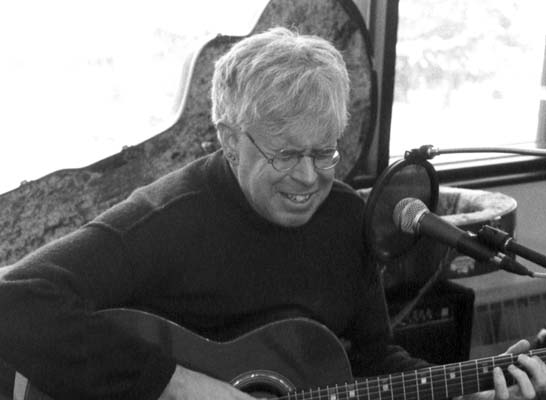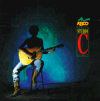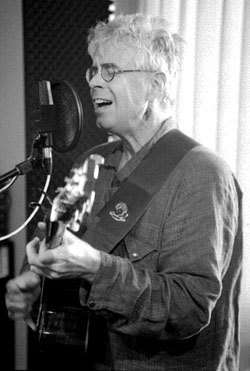[plays 'Let The Bad Air Out']

Above: Bruce Cockburn at KBCO. Photo by Jeff Uhrlaub.
Click to access Jeff's site and inquire about ordering this or other photos of Cockburn.
KBCO: I've always admired you because musically you've spent a lot of time put a
lot of your effort into environmental causes and political causes in
the'80's. I know you took a trip to Central America and Mexico which
influenced a lot of your music. You've been doing some benefits on the west
coast. I know that you performed in Kosovo in September and you were invited
to Vietnam by the Vietnam Veterans of America. Can you talk about that?
BC: Which one of those things would you like me to talk about?
KBCO: I believe it was to ban land mines.
BC: There's a connection among several of the things that you mentioned.
That connection is the issue of land mines. We did a series of shows in
California - we being EmmyLou Harris, who organized this thing, and Steve
Earl - they were on all of the shows, I was in on three of them. The other
sort of revolving cast included John Prine, Kris Kristofferson, Patty
Griffin, a host of others - really good people, good shows, and generated
quite a bit of public interest in the issue of land mines.
If you live in
North America, which we do, you don't tend to run across those things, unless
you're in the military and have done service overseas. But when you travel
in countries where land mines are a problem, you can't ignore it. At the
very least, you're limited in terms of the places you can go because these
things are sitting there in the ground waiting to get you. People who live
there, of course, don't have the luxury of not going where they live, so they
go out in the woods to gather firewood or fruit to eat or the kids go out to
herd cattle or other farm animals or whatever and they hit mines and they
blow up.
And of course, they don't blow up dead, they survive the encounter
and they're missing pieces at that point and they're condemned to a life of
suffering and a life of being a burden to their families and on the social
systems that they're a part of. It's a terrible and relatively easily
solve-able problem in the world. It's a plague not unlike AIDS in a way.
It's a 20th century creation. The cure, unlike AIDS, is very easily in
sight. It's just a matter of people deciding that we don't need them any
more.
A lot of countries have made that decision - there's 136 or 137
countries that are signatory to an international treaty banning the
manufacture and the use of land mines. Unfortunately the US isn't one of
those countries. So the purpose of doing shows like the ones we just did is
to help get people aware of the need to help get the US involved in that. To
be fair, to keep it in perspective, the US is doing good work in terms
'de-mining' of taking the mines out of the ground that are there, and there's
about 100,000,000 of those, so there's a lot of work to be done in that
department.
KBCO: I just want to say thanks and that your efforts don't go unnoticed. Now
tomorrow's show will be a holiday show and I was told that perhaps you could
do a Christmas song for us.
BC: Well I don't have my Christmas repertoire together but when I did the
Christmas album I did a few years ago, I came up with a version of 'We Three
Kings' that was supposed to include the recitation of the T.S. Elliot poem
'Journey of the Magi', because I never liked the lyrics of 'We Three Kings' -
the Christmas carol. It's a beautiful tune with some of the suckiest lyrics
ever written (laughs) (clears throat) in my humble opinion.
So I had this instrumental version of it, and we actually did a version of it with Lou Reed reading the poem on one of the Christmas radio shows that I did. I don't
know the poem well enough to recite it, so I'll have to give you the
instrumental version without that.
The reason it didn't end up on the Christmas Album is that T.S. Elliot's heirs or successors didn't feel that his poetry would be well served being on a 'pop' record. So they didn't want me to use it. But they were conveniently ignoring 'CATS' which is all T.S. Elliot's poetry. But sour grapes will get you nowhere.
[plays 'We Three Kings']
KBCO: I understand that you made a deal with the devil (our Studio C producer) to do a special request. Would you like to set that up for us?
BC: This is an old song which is why i suppose it is something like a deal
with the devil but hardly that, given the nature of the song. It's a song I
sort of let lie fallow for quite a while but I had another special request to
do it on Italian TV earlier this year. It ended up in the soundtrack of an
Italian film and there was the need to go and to it on TV. So I had to learn
it again and I've been doing it now and again since, and I'm kind of glad
because I feel pretty good about. This is called 'Lord of the Starfields'
[plays 'Lord of the Starfields']
Special thanks to Philip Jongejan for this transcript, who has been a BC fan since he "was a kid, living in Toronto in the 70's." Philip owns his own company - North End Sound - which specialises in concert sound in the Denver, Colorado area, arranging sound systems for local acts in festival and corporate settings and the occasional big name gigs, which have included Don Maclean, the Association, and Bill Halley & the Comets.
News Index
This page is part of The Cockburn Project, a unique website that exists to document the work of Canadian singer-songwriter and musician Bruce Cockburn. The Project archives self-commentary by Cockburn on his songs and music, and supplements this core part of the website with news, tour dates, and other current information.
 second of their annually released albums (pictured right) has a version of Kit Carson on it. KBCO has just released their 11th annual volume but have not posted the track listing on their website as of yet. However, Bruce performed live in Studio C earlier this year, and may have made it onto this year's CD.
second of their annually released albums (pictured right) has a version of Kit Carson on it. KBCO has just released their 11th annual volume but have not posted the track listing on their website as of yet. However, Bruce performed live in Studio C earlier this year, and may have made it onto this year's CD.  11 December 1999 -- Colorado rock station KBCO, 97.3, hosted Bruce Cockburn in their Studio C for some live songs and an interview on December 8th. KBCO also sponsored a Cockburn gig the following night at the Gothic Theatre in Denver with Tori Amos.
11 December 1999 -- Colorado rock station KBCO, 97.3, hosted Bruce Cockburn in their Studio C for some live songs and an interview on December 8th. KBCO also sponsored a Cockburn gig the following night at the Gothic Theatre in Denver with Tori Amos.
